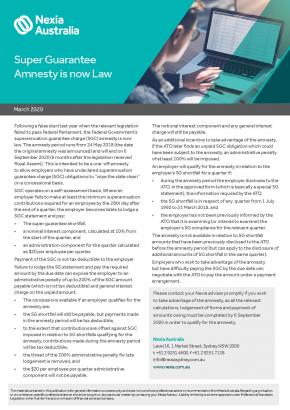Following a false start last year when the relevant legislation failed to pass Federal Parliament, the Federal Government’s superannuation guarantee charge (SGC) amnesty is now law. The amnesty period runs from 24 May 2018 (the date the original amnesty was announced) and will end on 6 September 2020 (6 months after the legislation received Royal Assent). This is intended to be a one-off amnesty to allow employers who have undeclared superannuation guarantee charge (SGC) obligations to “wipe the slate clean” on a concessional basis.
SGC operates on a self-assessment basis. Where an employer fails to make at least the minimum superannuation contributions required for an employee by the 28th day after the end of a quarter, the employer becomes liable to lodge an SGC statement and pay:
The super guarantee shortfall,
- a nominal interest component, calculated at 10% from the start of the quarter, and
- an administration component for the quarter calculated as $20 per employee per quarter.
- Payment of the SGC is not tax-deductible to the employer.
Failure to lodge the SG statement and pay the required amount by the due date can expose the employer to an administrative penalty of up to 200% of the SGC amount payable (which is not tax-deductible) and general interest charge on the unpaid amount.
The concessions available if an employer qualifies for the amnesty are:
- the SG shortfall will still be payable, but payments made in the amnesty period will be tax-deductible,
- to the extent that contributions are offset against SGC imposed in relation to SG shortfalls qualifying for the amnesty, contributions made during the amnesty period will be tax-deductible,
- the threat of the 200% administrative penalty for late lodgement is removed, and
- the $20 per employee per quarter administrative component will not be payable.
The notional interest component and any general interest charge will still be payable.
As an additional incentive to take advantage of the amnesty, if the ATO later finds an unpaid SGC obligation which could have been subject to the amnesty, an administrative penalty of at least 100% will be imposed.
An employer will qualify for the amnesty in relation to the employer’s SG shortfall for a quarter if:
- during the amnesty period, the employer discloses to the ATO, in the approved form (which is basically a special SG statement), the information required by the ATO,
- the SG shortfall is in respect of any quarter from 1 July 1992 to 31 March 2018, and
- the employer has not been previously informed by the ATO that it is examining (or intends to examine) the employer’s SG compliance for the relevant quarter.
The amnesty is not available in relation to SG shortfall amounts that have been previously disclosed to the ATO before the amnesty period (but can apply to the disclosure of additional amounts of SG shortfall in the same quarter).
Employers who wish to take advantage of the amnesty but have difficulty paying the SGC by the due date can negotiate with the ATO to pay the amount under a payment arrangement.
Please contact your Nexia Advisor promptly if you wish to take advantage of the amnesty, as all the relevant calculations, lodgement of forms and payment of amounts owing must be completed by 6 September 2020 in order to qualify for the amnesty.


